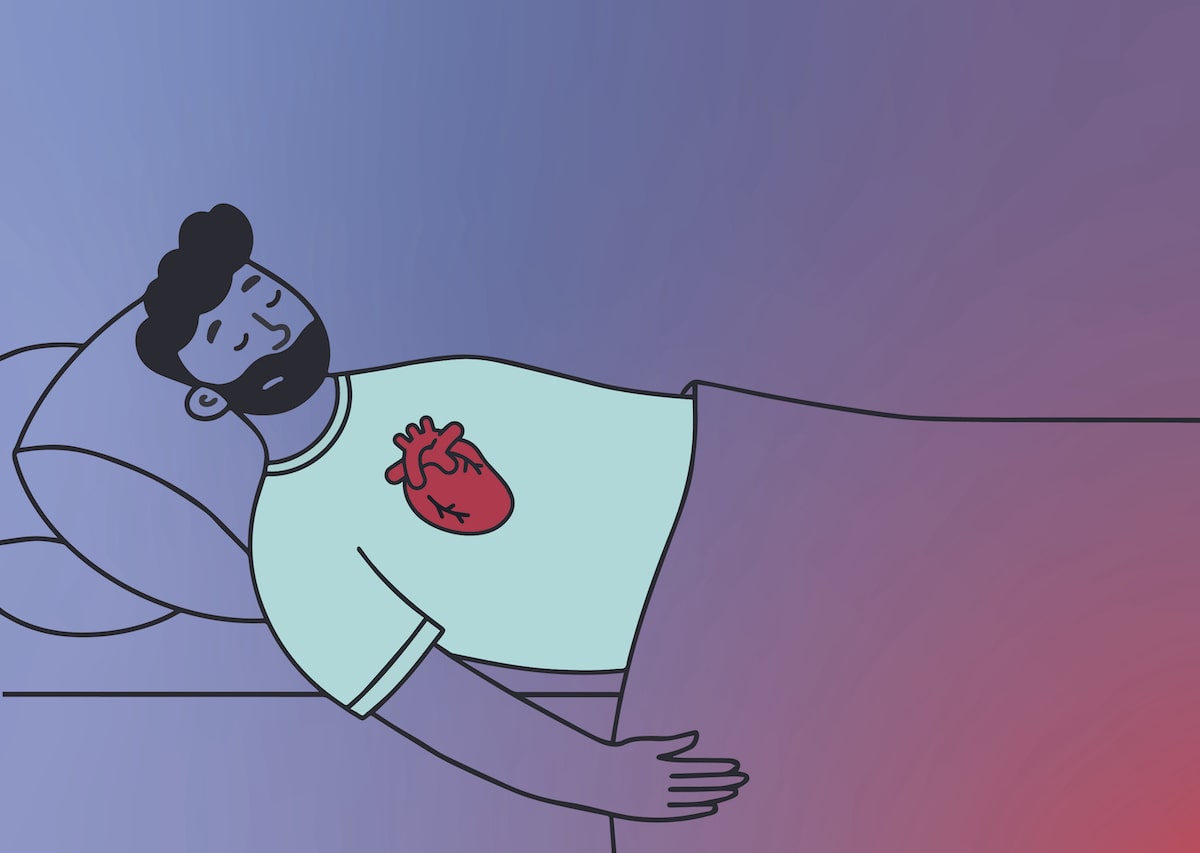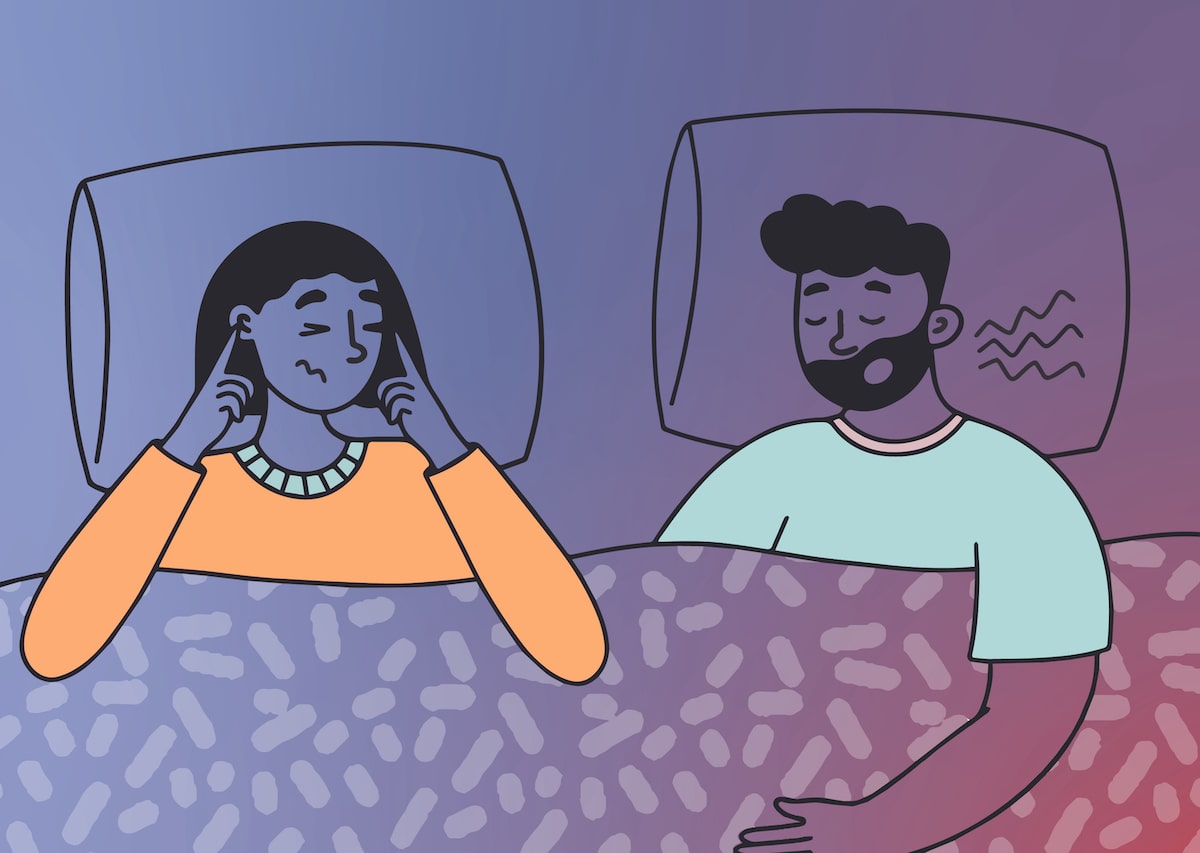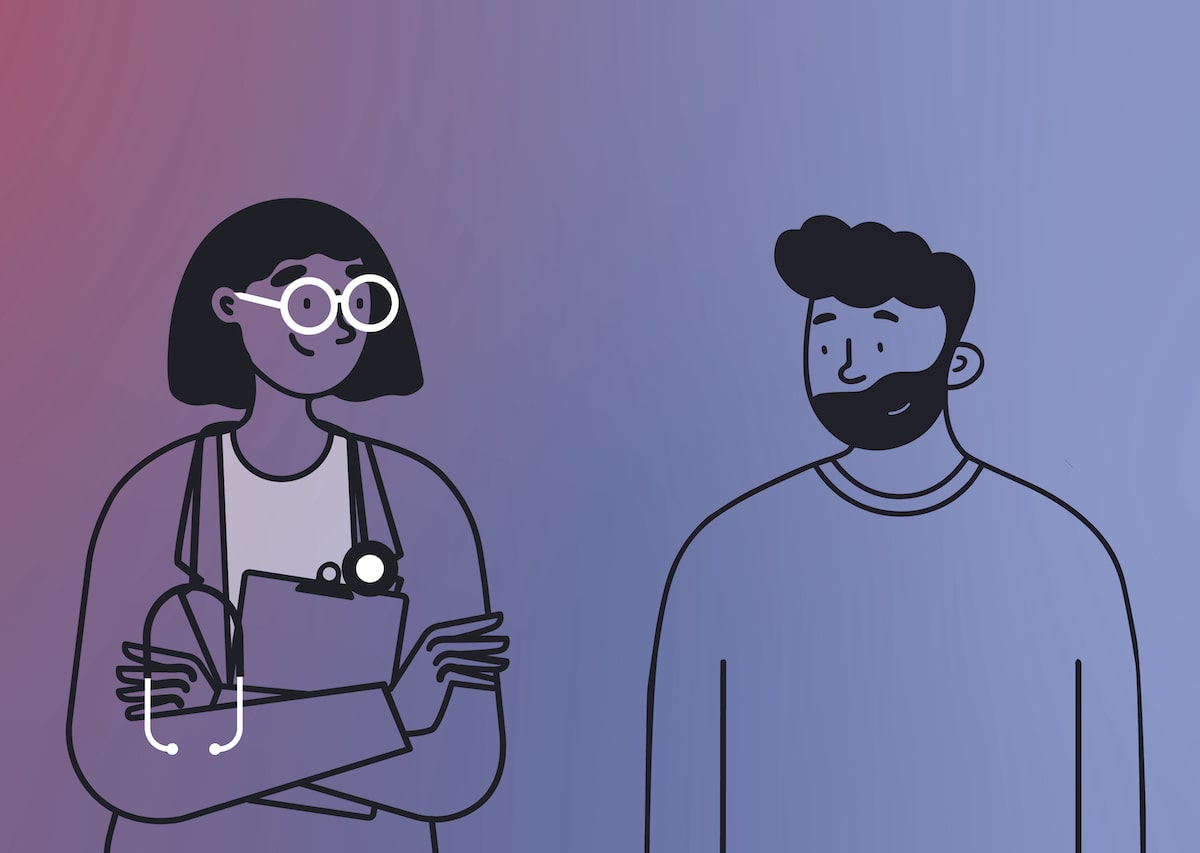Though rare, a person can die in their sleep from health complications like sleep apnea, cardiac arrest, and stroke.
In this article, we’ll explain how and why people might die in their sleep, provide some statistics on the frequency of dying in your sleep, and answer some common FAQs. If you’re curious about your risk factors or the risk factors of any elderly people in your life, this guide should answer some questions for you.
How Do People Die in Their Sleep?
Dying in your sleep can be caused by multiple different health issues and external factors. The most common cause of dying in your sleep is sudden cardiac death. Sudden cardiac death is the cause of 15-20% of deaths worldwide, and according to the Sudden Cardiac Arrest Foundation about 30% of those deaths occur at night. Read on below for more information on this and other medical conditions.

Cardiovascular Issues
Cardiovascular issues are a leading cause of dying in your sleep. Sudden cardiac death, caused by cardiac arrest, is the top cause. Women are more likely than men to experience sudden cardiac death during sleep, according to a study by the Center for Cardiac Arrest Prevention. A cardiac arrhythmia, or irregular heart rate, could also lead to sleep-related death. Sudden arrhythmic death syndrome (SADS) occurs when an untreated arrhythmia leads to a sudden cardiac arrest.
Cardiovascular disease is the leading cause of death (whether during sleep or not), so be sure to get an annual physical to assess your risk of things like heart attacks and coronary artery disease. The American Heart Association recommends getting your blood pressure checked at least once every two years after you turn 20, because high blood pressure can greatly increase your risk of heart disease and stroke. Regular preventative care can help prevent a heart condition in the future, especially if heart health problems run in the family. Discovering and treating a cardiovascular problem might also help you stop sleepwalking!
Stroke
Strokes may also lead to death during sleep. In fact, 25% of strokes occur during sleep. People with obstructive sleep apnea are more likely to have a stroke at night than others because sleep apnea can affect oxygen levels in the brain during sleep. Read the section below for more information about sleep apnea.

Sleep Apnea
People with sleep apnea are at higher risk of sudden cardiac death and stroke at night. The Cleveland Clinic explains that sleep apnea causes abnormal heart rhythms, and may close the upper airway in your chest, stressing the heart. If you suffer from this sleep disorder you are at increased risk of heart failure and stroke, so we recommend working with a healthcare provider to address your symptoms and their underlying causes.
If you want to find out more about sleep apnea, check out our What is Sleep Apnea guide. Our lead reviewer Marten actually has sleep apnea himself, so he has tons of great knowledge to share with anyone who wants to learn more.
Carbon Monoxide Poisoning
Carbon monoxide poisoning occurs when carbon monoxide builds up in your bloodstream, leading to tissue damage and potentially death. If you’re exposed to carbon monoxide while sleeping, you won’t notice any symptoms. While awake, you might notice headache, weakness, dizziness, nausea, and shortness of breath. Carbon monoxide is odorless, tasteless, and colorless, so you won’t be able to detect it on your own. Be sure your home’s carbon monoxide detectors are all functioning properly to stay safe.
Overdose
Overdose may lead to unexpected death and can be very difficult for loved ones to process. Common sleep-related overdoses are sleeping pill overdoses. Sleeping pills are dangerous when mixed with alcohol and could lead to an accidental overdose. You should never mix pills and alcohol because of the high risk of death associated with doing so.
Binge drinking at night may also lead to alcohol poisoning and potentially death – especially if you vomit in your sleep and don’t wake up to clear the blockage in your airways. Always drink responsibly, and follow-up with a healthcare provider if you’re concerned you might be struggling to manage your drinking on your own.
Sudden Infant Death Syndrome (SIDS)
SIDS describes the sudden and unexpected death of a baby under one year of age. Brain defects and respiratory infections may be part of the cause. While SIDS is not preventable, putting your new baby to sleep on his or her back can reduce risk.
What Are the Chances of Dying in Your Sleep?
As we explained above, heart disease is the most common way to die in your sleep. About 1 in 8 people who die from heart disease will die in their sleep. Similarly, 25% of strokes occur during sleep.
In general, your chances of dying in your sleep are fairly low if you have no additional risk factors. If you have obstructive sleep apnea, you may be at higher risk of dying in your sleep. According to Dr. Chad Denman, people with obstructive sleep apnea have a 30% higher risk of cardiac-related death. A study by the American Academy of Sleep Medicine also indicated that people with obstructive sleep apnea are at greater risk of death.
Dr. Zeeshan Afzal, Medical Officer at Welzo, notes, “Risk factors associated with sudden unexpected deaths during sleep include advanced age, pre-existing medical conditions such as cardiovascular disease or sleep apnea, a history of substance abuse, and genetic factors.”
“It’s important to note that sudden unexpected deaths during sleep are relatively rare, and individuals who are concerned about their risk should speak with a healthcare provider,” says Dr. Afzal.
Somniphobia and the Fear of Dying in Your Sleep
The fear of dying in your sleep may contribute to somniphobia, or the overwhelming fear of sleep.
According to Daniel Matchar, licensed social worker and therapist, the fear of death is common. However, Matchar advises, “If the fear of dying begins to cause clinically significant distress to you or impairment in social, occupational, or other important areas of functioning, this fear may have developed into an anxiety disorder.”
For those struggling with an overwhelming fear of death or somniphobia, cognitive behavioral therapy (CBT), as well as relaxation techniques like meditation, can help.

Tips for Staying Healthy
Staying healthy can help prevent sleep-related death, especially if you are diligent about your heart health. Below are some tips on staying healthy well into old age.
- Get regular physicals. Your doctor will help you assess any risk factors that may need attention.
- Eat a healthy, balanced diet. This will help with your cardiovascular (and overall) health, plus it might even help you sleep better. Learn how nutrition impacts sleep in our sleep health guide.
- Get enough sleep. Getting enough sleep improves your overall health and can make it easier to take on your day.
- Manage stress and prioritize mental health. Stress elevates your risk of a multitude of health problems, including high blood pressure and heart disease. Sleep and mental health are also tied together. So if you find yourself struggling to sleep through the night or up late worrying about dying in your sleep, you may want to check in with your doctor.
- Exercise! The link between sleep and exercise is well-established, as is the link between heart health and exercise. You’re sure to benefit from a regular exercise regime, whether you want to sleep better at night or ensure you avoid a heart condition.
Final Thoughts
While nobody likes to think about dying, it can be comforting to learn more about certain health conditions. We hope this article has answered some of your questions and assuaged some of your fears.
FAQs About Sleep and Death
If you still have questions, read on.
Can you die in your sleep from anaphylaxis?
Yes, it is possible to die in your sleep from anaphylaxis. Anaphylactic shock is an allergic reaction that closes your airways. If you have a severe allergic reaction in your sleep it could be fatal if you are not treated in time.
Can you die from a panic attack in your sleep?
No, it is not possible to die from a panic attack in your sleep. Panic attacks are not life-threatening, though symptoms of panic attacks may be similar to symptoms of a heart attack.
Can you die from acid reflux in your sleep?
There are no reported cases of anyone dying from acid reflux in their sleep. You will not choke to death in your sleep if you have acid reflux. If you have sleep apnea, your acid reflux symptoms may be worse at night. You may want to look into treatment for your sleep apnea, your acid reflux, or both.
Can you die in your sleep from low blood pressure?
You are unlikely to die in your sleep from low blood pressure. Death may result from prolonged low blood pressure, but most often low blood pressure self-resolves. Your doctor will be able to tell you your low blood pressure is being caused by an underlying condition that needs treatment.
Can you die of low blood sugar in your sleep?
Low blood sugar could lead to seizures or (in very rare cases) death if you are diabetic. Stanford Medicine describes a study on monitoring blood sugar during sleep.

